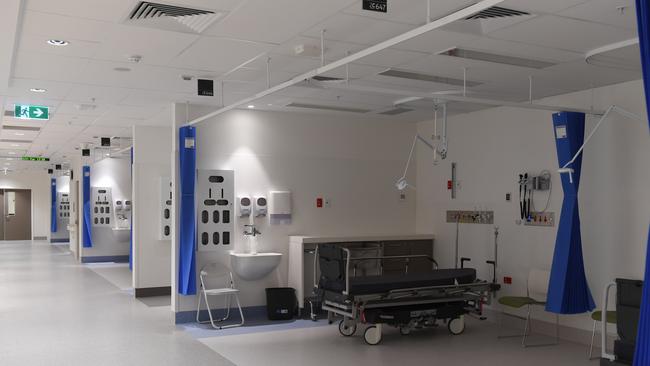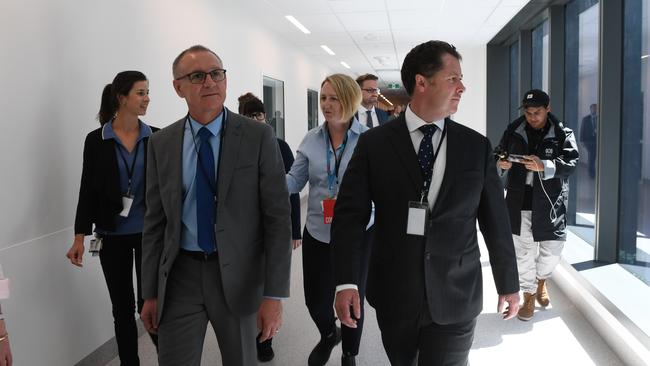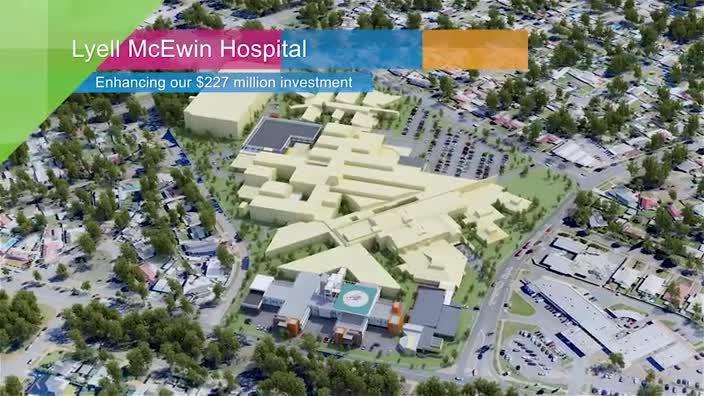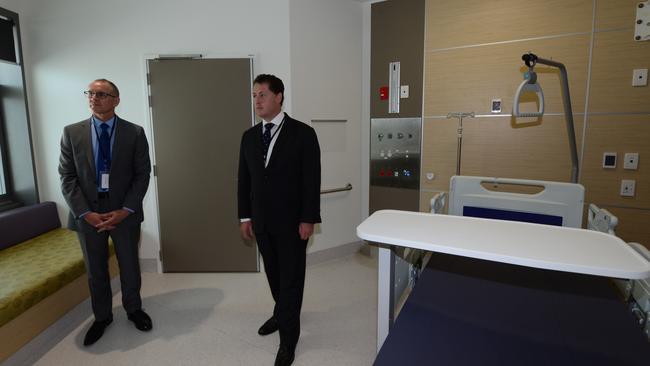Warren Jones: Transforming Health needs major surgery to avoid further damage to South Australia health system
WARREN Jones has become one of the most vocal critics of the Transforming Health program. On its second anniversary, he presents a scathing audit of its various problems.

- Latest pics: See inside the new Royal Adelaide Hospital
- Builders of new RAH face legal bill after losing Supreme Court battle
- What can we expect when the new $2.3bn RAH finally opens?
- First pictures inside the near-complete new Royal Adelaide Hospital
THE somewhat tortured evolution of the Weatherill Government’s Transforming Health agenda has degenerated into a scramble to rearrange deckchairs on a ‘foundering ship’, along with clandestine, fragmentary and potentially unsafe attempts to close public hospital beds.
It is becoming clear that the loss of the Repat Hospital cannot be compensated for, and that we can afford to lose no further beds from our hospital system. Predictions of ‘efficiency gains’ of up to 30 per cent are unattainable. Gains of 3 per cent might be realistic, but will be offset within a few years by an inexorable annual increase, of the same order, in hospital activity.
Transforming Health had its genesis in State Treasury as an attempt to excise $900 million from the hospital budget, primarily by closing hundreds of beds. Given that this is proving impossible and that the net number of hospital beds will have to increase over time to accommodate the needs of our population, the whole fabric of Transforming Health can be seen as a ‘house of straw’.
It is now two years since Transforming Health was launched. In that time, ill-considered plans for a major Eye Health Centre at Modbury, and for the closure of the Noarlunga Emergency Department (ED) and the Flinders Medical Centre (FMC) neonatal intensive care unit have been abandoned.

Substantial infrastructure projects have been initiated; some of them with dubious justification. The new Rehabilitation and Psychogeriatrics buildings at FMC reduplicate two modern state-of-the art facilities at the Repat.
The replacement of the Repat Hospice and PTSD Ward 17 by inappropriately sited and functionally inadequate new facilities at FMC and the Glenside campus respectively, is an unfortunate and unnecessary consequence of the decision to close the Repat.
Many of the tenets of the Transforming Health agenda are based on a predetermined cost-cutting model devised by global management consultants McKinsey and Company.
WHAT WARREN JONES WROTE ABOUT TRANSFORMING HEALTH IN OCTOBER 2015
This model is geared to circumscribed high density metropolitans totally unlike Adelaide with its 105km north-south spread and a demography that includes substantial pockets of elderly and disadvantaged patients.
The McKinsey model, as adopted in Transforming Health, rationalises and isolates particular specialist services in designated hospitals.
This foreshadows the closure of three hospitals, and the downgrading of EDs and specialist services in a further three important general hospitals.
It creates complicated and confusing procedures to differentiate ‘right’ from ‘wrong’ destinations for both emergency and elective health care.

The logistic difficulties this poses in hospital access for the aged, the infirm, the disadvantaged and non-English speaking patients and their relatives are unacceptable in a modern compassionate society.
The problems associated with Transforming Health are widespread and potentially irreversible. They affect all three Local health Networks, and they are underlain by the incomprehensible historical decision to attempt to open the new RAH at the same time as the Transforming Health disruptions are having their maximum impact on an unprepared hospital system.
Thus the ‘ramping down’ of the old RAH in preparation for the transition to the new hospital will be complicated by downgrading and bed closures in four of our seven metropolitan hospitals.
Another undercurrent of concern is the perseverance of SA Health with the inordinately expensive, outdated and cumbersome Enterprise Patient Management System (EPAS).
It is unclear whether this system can ever be made to work in acute clinical situations or for electronic chemotherapy dosage and monitoring.

There are no comprehensive or realistic plans to accommodate the outpatients from the Repat or the considerable number of patients on waiting lists for multiday (major) surgery. At present there are over 600 patients waiting for joint replacements.
There is no room for these and other surgical patients at FMC.
The original Transforming Health blueprint saw these, often old and infirm, patients travelling to the Queen Elizabeth Hospital (QEH) for their surgery. This plan has been abandoned, but has no replacement.
Noarlunga Health Service is on the way to becoming a ‘cottage’ hospital with a short-stay surgical facility, but no acute services, and with a downgraded drop-in casualty centre.
In the north, Modbury Hospital has had all acute multi-dad beds removed, the ED is dysfunctional, and without back-up emergency support services, is potentially unsafe.
In the meantime the Lyell McEwin Hospital (LMH) is overcrowded with a regularly overloaded ED.
Health care in the west, with its burgeoning elderly population, is likely to fare particularly badly under Transforming Health.
The planned progressive decimation of acute specialist medical services (notably cardiology), and the downgrading of high dependency and ED facilities will see many disadvantaged patients and their relatives travelling to the nRAH and beyond for their hospital care.

The implications of the proposed closure of the Hampstead Rehabilitation Centre (HRC) have exposed deep flaws in Transforming Health.
A key principle entailed co-locating rehabilitation services with acute medical support services in general hospital settings at Modbury and the QEH.
However the implementation of this sensible proposal has been abrogated by the curious decision to remove acute services from these two hospitals.
The plans for Hampstead and the QEH have been uniformly rejected by senior medical staff at both hospitals.
They have now been put on hold by SA Health pending consideration of a significant new build at the QEH to house the relocated rehabilitation services.
It is important that the Government and SA Health, with the assistance of a concerned community of health professionals, should now pause and take stock of the unnecessary disruptions being inflicted by Transforming Health on our hospitals and patients.
It is not too late to limit further damage and to reverse at least some of the more ill-considered plans.
Warren Jones is Emeritus Professor at Flinders University and a vocal critic of the Transforming Health program
